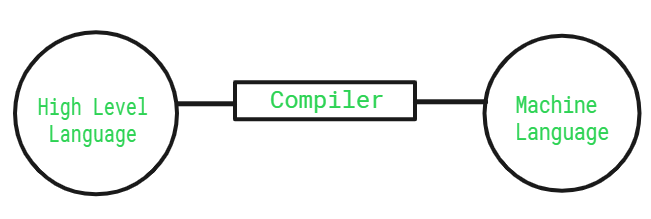Difference Between Compiler and Interpreter (original) (raw)
Last Updated : 27 Sep, 2024
The Compiler and Interpreter, both have similar works to perform. Interpreters and Compilers convert the Source Code (HLL) to Machine Code (understandable by Computer). In general, computer programs exist in High-Level Language that a human being can easily understand. But computers cannot understand the same high-level language, so for computers, we have to convert them into machine language and make them readable. In this article, we are going to see the differences between them.
What is a Compiler?
The Compiler is a translator that takes input i.e., High-Level Language, and produces an output of low-level language i.e. machine or assembly language. The work of a Compiler is to transform the codes written in the programming language into machine code (format of 0s and 1s) so that computers can understand.
- A compiler is more intelligent than an assembler it checks all kinds of limits, ranges, errors, etc.
- But its program run time is longer and occupies a larger part of memory. It has a slow speed because a compiler goes through the entire program and then translates the entire program into machine codes.
Role of a Compiler
For Converting the code written in a high-level language into machine-level language so that computers can easily understand, we use a compiler. Converts basically convert high-level language to intermediate assembly language by a compiler and then assembled into machine code by an assembler.

Compiler
Advantages of Compiler
- Compiled code runs faster in comparison to Interpreted code.
- Compilers help improve the security of Applications.
- Compilers give Debugging tools, which help in fixing errors easily.
Disadvantages of Compiler
- The compiler can catch only syntax errors and some semantic errors .
- Compilation can take more time in the case of bulky code.
What is an Interpreter?
An Interpreter is a program that translates a programming language into a comprehensible language. The interpreter converts high-level language to an intermediate language. It contains pre-compiled code, source code, etc.
- It translates only one statement of the program at a time.
- Interpreters, more often than not are smaller than compilers.
Role of an Interpreter
The simple role of an interpreter is to translate the material into a target language. An Interpreter works line by line on a code. It also converts high-level language to machine language.

Interpreter
Advantages of Interpreter
- Programs written in an Interpreted language are easier to debug.
- Interpreters allow the management of memory automatically, which reduces memory error risks.
- Interpreted Language is more flexible than a Compiled language.
Disadvantages of Interpreter
- The interpreter can run only the corresponding Interpreted program.
- Interpreted code runs slower in comparison to Compiled code.
Difference Between Compiler and Interpreter
**Both compilers and interpreters serve the same purpose but work in different ways. If you're aiming to master the technical nuances between these two and prepare for exams like GATE, the **GATE CS Self-Paced Course dives deep into the differences and practical implementations, offering hands-on experience in both areas.
| Compiler | Interpreter |
|---|---|
| ****Steps of Programming:**Program Creation.Analysis of language by the compiler and throws errors in case of any incorrect statement.In case of no error, the Compiler converts the source code to Machine Code.Linking of various code files into a runnable program.Finally runs a Program. | ****Steps of Programming:**Program Creation.Linking of files or generation of Machine Code is not required by Interpreter.Execution of source statements one by one. |
| The compiler saves the Machine Language in form of Machine Code on disks. | The Interpreter does not save the Machine Language. |
| Compiled codes run faster than Interpreter. | Interpreted codes run slower than Compiler. |
| Linking-Loading Model is the basic working model of the Compiler. | The Interpretation Model is the basic working model of the Interpreter. |
| The compiler generates an output in the form of (.exe). | The interpreter does not generate any output. |
| Any change in the source program after the compilation requires recompiling the entire code. | Any change in the source program during the translation does not require retranslation of the entire code. |
| Errors are displayed in Compiler after Compiling together at the current time. | Errors are displayed in every single line. |
| The compiler can see code upfront which helps in running the code faster because of performing Optimization. | The Interpreter works by line working of Code, that's why Optimization is a little slower compared to Compilers. |
| It does not require source code for later execution. | It requires source code for later execution. |
| Execution of the program takes place only after the whole program is compiled. | Execution of the program happens after every line is checked or evaluated. |
| Compilers more often take a large amount of time for analyzing the source code. | In comparison, Interpreters take less time for analyzing the source code. |
| CPU utilization is more in the case of a Compiler. | CPU utilization is less in the case of a Interpreter. |
| The use of Compilers mostly happens in Production Environment. | The use of Interpreters is mostly in Programming and Development Environments. |
| Object code is permanently saved for future use. | No object code is saved for future use. |
| C, C++, C#, etc are programming languages that are compiler-based. | Python, Ruby, Perl, SNOBOL, MATLAB, etc are programming languages that are interpreter-based. |
Conclusion
In summary, compilers and interpreters both serve the purpose of converting high-level code into something a computer can understand, but they do so in different ways. A compiler translates the whole program at once, which can make it run faster but takes more time to compile. An interpreter translates and runs the code line by line, making it easier to catch errors and debug, though it may run slower.